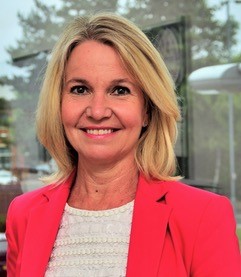Eva-Lotta Allan
BioLeaders Interview – Eva-Lotta Allan (March 2020)

Following my departure from the Karolinska Institute in Sweden, I have spent most of my career in the biotech world (over 30 years). I have lived and worked in Sweden, USA, Spain and Belgium and I have lived in England for the last 30 years. My career includes companies such as Vertex Pharmaceuticals, Ablynx and Immunocore, where I believe I made a difference, before transforming myself, in 2018, into a serial biotech board director (Chair and NED). I am currently on the Board of Targovax, Crescendo Biologics, C4X Discovery and Aleta Biotherapeutics.
I love travelling the world with my partner, experiencing new cultures, food and scenery. I am a huge animal lover and I am rather partial to driving fast cars.
Key milestones in your career journey to date?
- The opportunity to join Amersham International (now GE Healthcare) taught me how to sell, an invaluable foundation throughout my career.
- This opened the doors to work with very successful, rapidly growing biotech companies “right place at the right time” such as OGS, Oxford Asymmetry (1st IPO), Vertex (first Board role and leading a larger team), followed by Ablynx (2nd IPO and numerous deals) and Immunocore (more deals and a $320M Series A round).
In 2018 I took the decision to develop a portfolio career as a serial NED/Chair working with growing biotech companies which value my range of commercial and leadership experiences; mentoring the next generation entrepreneurs and leaders.
Who has had the greatest influence over your career?
Early on in my career it was my late Professor George Klein at the Tumour biology department at the Karolinska Institute. He showed me what passion for science meant and how dedication and tenacity will get you the result you are searching for. Never give up!
I was influenced by many charismatic leaders at Vertex. However, the person who stands out, at different times in my career, is Dr Edwin Moses. We worked together at Amersham and Oxford Asymmetry (today Evotec). Some years later, he gave me the opportunity to participate in building Ghent-based Ablynx from a small, rather academic biotech to a publicly listed, major biotech company. This is where I was given the opportunity to lead and mentor others, raise serious private and public money (IPO) as well as concluding multiple, significant innovative deals. Edwin taught me a great deal, believed in me and was fully supportive.
Your approach to spotting and developing top talent?
- Always go with your gut instinct when hiring top talent. Don’t try to fit a square peg into a round hole. It is better not to hire than compromise with second best. Hire the best person who has the potential to grow beyond the role and empower them. The most academically qualified person is not always your best hire; EQ is key and often just as important as IQ.
- Develop the top talent by guiding them and giving them space, don’t micro-manage! “Be the change” yourself that you want to see in others, i.e. lead by example.
What attributes make an outstanding leader in today’s world?
- Somebody with integrity, passion, a high work ethic, focus and drive who can recognise opportunities before others do.
- Somebody who has the vision and isn’t afraid to take calculated risks.
What is our industry’s contribution to improving climate change?
This is a very big issue and our industry must continue to contribute in many ways to create a more sustainable climate for future generations. Companies I am involved with are focused on some of the following ideas:
- Think smarter when engaging in business meetings and attending conferences; using technology in the place of travel and working from home.
- Utilise your laboratory space better and recycle old space, rather than expand and build too soon.
- Think smarter when we embark on scientific projects (use less plastic, recycle) and clinical studies.
- How can we be more efficient without cutting corners?
How do you create a culture of continual learning, innovation and curiosity?
Back in the 90’s Japanese KAIZEN (continuous improvement) was a strong concept. Always try to improve, aim to be the best. Give people the opportunity to expand their horizon beyond their job description. Mentor them by exposing them to new experiences, drop them in the deep end in a safe environment where it is OK to fail or make a mistake. BUT learn from it and make it a success next time!
What’s your hidden talent or something that might surprise others about you?
- As a little girl in Sweden I was on the radio singing and playing the piano in a programme called “Uncle Sven’s letterbox”. I was invited back twice, and each time was paid the equivalent of £1.50 (yes it was a long time ago and I was 8)!
- Last year I was a zookeeper for a day at London Zoo in Regents Park and I loved it. Shovelled a lot of big poo, cut up a lot of veg for the tapirs and giraffes, created stimulating toys for the meerkats, fed the otters with live crickets and cleaned up by the penguin pool surrounded by a lot of curious penguins. The best Christmas present ever.
- I was a keen sportswoman and one of my key sports was fencing. I once managed a draw against Sweden’s Olympic female fencer. She was not happy.
Thoughts on the current funding model for early stage companies?
With difficult volatile public markets, and plenty of money available for private early stage companies, I recommend staying private longer and not listing prematurely. Certainly don’t try to launch yourself in the US as a European company before you have reached critical mass and can stand out amongst the crowded US biotech market.
What will be the biggest technological transformation in the industry over the next 5 years?
Developing better small molecules and biologic drugs, faster, by applying early AI technologies and software platforms for target identification, and the creation of better drugs, where there is an improved understanding of the required shape of the molecule. This approach lowers attrition and results in more cost-effective drug development.
Your views on encouraging volunteering amongst colleagues?
Volunteering is a great opportunity for people to engage in the community either with a charity, patient organisation or in the healthcare system. This should be encouraged, and charity sports events also create team building opportunities in companies.
Your legacy to the sector?
Growing a number of start-ups into significant biotech companies by:
- Concluding a large number of innovative licensing deals and funding rounds including the largest round in Europe and the second largest round in the world in 2015 in the sector.
- Hiring, developing and mentoring the best – next generation talented management.
Your simple philosophy on life?
Work hard and stay focused on what you want to achieve and ensure you have fun along the way.
Words of wisdom?
- Best advice I was given: Trust your gut instinct more often, believe in yourself!
- Advice I would give: Be courteous and respectful. Don’t walk on others to further your own career, bring people with you and build relationships with people externally and internally.
- What I wish I’d known: How much shoe leather I would use to walk the streets of San Francisco for the JPM conference, every January since 2002!
Click here to read more of our BioLeaders interviews.

